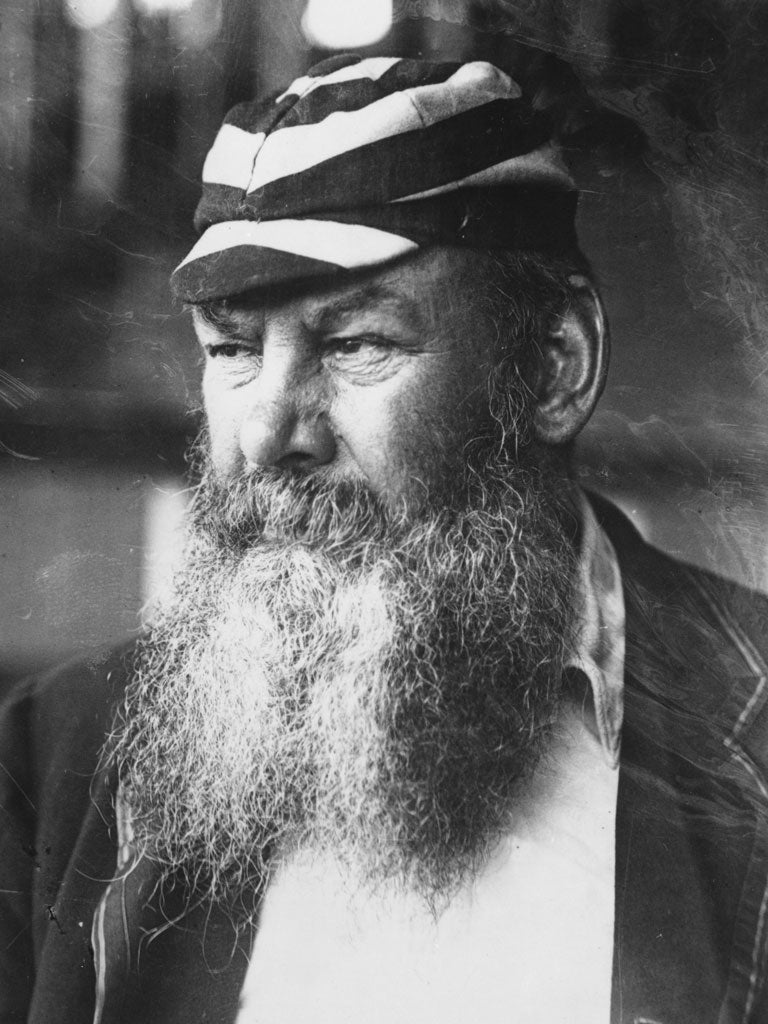Extraordinary life of the grand old man of English cricket; Amazing Grace by Richard Tomlinson; book review
Industrious, witty, insightful, this biography ought to be the standard work on W.G. for years to come

Your support helps us to tell the story
From reproductive rights to climate change to Big Tech, The Independent is on the ground when the story is developing. Whether it's investigating the financials of Elon Musk's pro-Trump PAC or producing our latest documentary, 'The A Word', which shines a light on the American women fighting for reproductive rights, we know how important it is to parse out the facts from the messaging.
At such a critical moment in US history, we need reporters on the ground. Your donation allows us to keep sending journalists to speak to both sides of the story.
The Independent is trusted by Americans across the entire political spectrum. And unlike many other quality news outlets, we choose not to lock Americans out of our reporting and analysis with paywalls. We believe quality journalism should be available to everyone, paid for by those who can afford it.
Your support makes all the difference.In 1894, the Bristol assize was hearing a case of sexual assault. Their parish doctor, Dr. Grace, testified that the defendant’s wife was too unwell to give evidence; stepping down from the witness box, Grace, better known by his initials, W.G., was asked to see the presiding judge in his chamber immediately. Whereupon, ‘Mr Justice Grantham produced a large book, opened it and handed Grace a pen.’ M’lud wanted an autograph.
Richard Tomlinson’s new biography of the Grand Old Man of English cricket succeeds handsomely, in this, the 150th anniversary of his first-class debut, in fleshing out the nature of W.G.’s extraordinary celebrity, as well as the telling and not altogether flattering light in which it cast his times. Making good use of the recent digitisation of newspaper archives, Tomlinson explains how the rise of mass spectator sports, and indeed the print media, helped propel Grace to stardom during a period where he lacked rivals from other sporting disciplines with whom to contest the night sky.
Not that he didn’t earn this fame, and Tomlinson reasserts the cricketing brilliance, which, almost a century after his death, saw Grace selected in Wisden’s all-time World Test XI. W.G. revolutionised the art of batting (he was no mean bowler either). At a time when the pitches were uniformly awful - occasionally fatal - he managed to score more centuries in his first ten years of first-class cricket than the next twelve most successful batsmen combined. And he did it not simply as the result of native genius, but through a very Victorian mixture of diligence and innovation, developing a repertoire of shots - some, like a digging stroke through the offside, personal inventions - from which, assessing conditions and opponents, he would select appropriately, and apply with rigour.
Grace emerges from Tomlinson’s book as almost too contemporary a character for his contemporaries; taking the game too seriously, so dismissed by many as a ‘cheat’. The misconception of him as money-grubbing - he earned more from cricket as a supposed amateur or ‘Gentleman’ than any professional - is in large part a result of his lacking a Gentleman’s independent wealth, a member of the rising middle-class daring to rub batting-pads with the aristocracy. Forced to take work as a GP to support his family, his nickname ‘the Doctor’, seems, in the context, oddly disparaging.
Tomlinson also debunks the complementary but contradictory caricature of Grace as an unlettered ‘rustic’, all too appealing as his weight ballooned over the years, and he developed into the familiar enormous, bearded figure of later life, staring out from portraits like a beetle-browed Falstaff. He captures the essential sweetness of a man who was too upset by the First World War to discuss it in level terms; who, in semi-retirement, approached his role as the manager of Eltham Cricket Club’s Second XI with Captain Mainwaring-like levels of intensity.
Industrious, witty, insightful, Amazing Grace ought to be the standard work on W.G. for years to come. Whether it alters the general impression of him seems less likely. Some of the exaggerations and apocrypha, such as Grace refusing to walk when given out because the crowd had come to see him, are, as Tomlinson points out, just a little too perfect.
Join our commenting forum
Join thought-provoking conversations, follow other Independent readers and see their replies
Comments